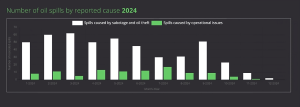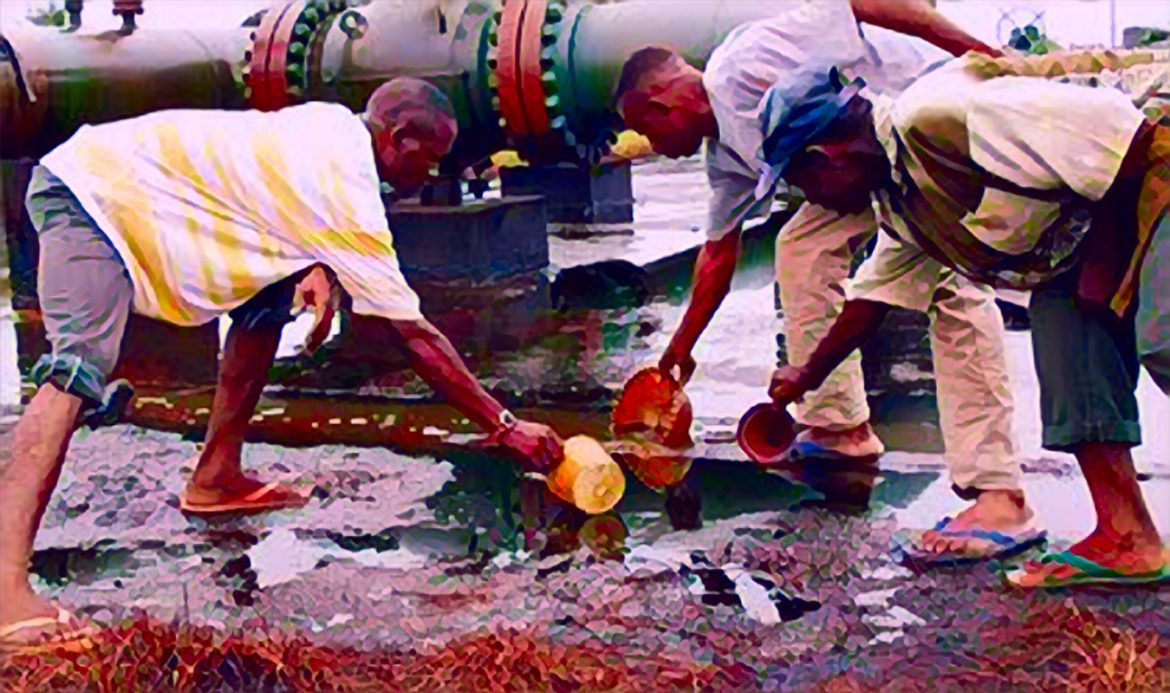KEY POINTS
- Nigeria loses billions annually to oil theft and pipeline vandalism, threatening its economy, security, and environment.
- Root causes include poverty, unemployment, corruption, and inadequate infrastructure monitoring in oil-rich regions.
- Legislative reforms, economic diversification, and community engagement are critical to addressing oil theft and vandalism.
Nigeria, Africa’s largest oil producer, has long relied on the petroleum sector as the major driver of the economy.
According to the Honorable Minister of State for Petroleum Resources (Oil) Heineken Lokpobiri PhD stated that “the Petroleum Industry is critical to Nigeria’s monetary and fiscal policy environment, with crude oil contributing about 90 percent of the Nation’s foreign exchange and up to 65 percent of the Government’s revenue.”
Nonetheless, a dark and ongoing threat lies beneath this wealth: oil theft and pipeline sabotage.
Oil theft, commonly referred to as illegal bunkering, entails the unauthorized extraction and trade of crude oil.
Pipeline vandalism involves the intentional damaging or interference with oil pipelines, frequently to enable theft or interrupt processes.
Collectively, these pursuits have evolved into systemic issues, with projected losses reaching billions of dollars each year.
In August 2023, National Security Adviser Mallam Nuhu Ribadu disclosed that Nigeria continued to lose approximately 400,000 barrels of crude oil daily to domestic and foreign thieves.
These dual challenges have escalated into a national emergency, greatly weakening Nigeria’s economic development, safety, and environmental sustainability.
Effects of oil theft and pipeline vandalism
The effects of the menace range from revenue loss, high operating cost, low FDI and oil spillage among others.
Loss of revenue
The degree of economic damage from crude oil theft and vandalism in Nigeria is unclear. Nevertheless, the shocking numbers indicate a significant loss.
According to NNPC’s GMD, Mr. Mele Kyari, Nigeria loses 200,000 barrels of crude daily to theft, totaling 73 million barrels annually, equating to over $7.3 billion yearly or $14.65 billion from 2016 to 2020, based on oil prices.
Also, Nigeria lost $3.2 billion to crude oil theft between January 2021 and February 2022.
Despite conflicting figures on the loss in 2023, in October 2023, the Nigerian Senate revealed that the country had lost N2.3 trillion to the menace of crude oil theft.
In 2024, pipeline destruction, oil theft, and unlawful refining were rampant. Estimates indicate that from January to July 2024, Nigeria suffered an average loss of 437,000 barrels of crude oil daily as a result of theft, vandalism, and other criminal actions, amounting to over $10 billion during that time frame.
Operating expenses
Ongoing vandalism and theft require expensive repairs, replacements and security. In 2023, the NNPC spent N136 billion on security, repairs and maintenance of vandalized infrastructure. Businesses frequently halt operations to tackle leaks, which further diminishes production.
Decrease in foreign investment
Ongoing security problems discourage foreign investment. On 16 January 2024, Shell announced selling its Nigerian onshore subsidiary for $2.5bn. In 2023, Equinor exited Nigeria, and Eni sold Nigerian Agip Oil Company to Oando (Offshore Technology, 2024).
Spills of oil
Vandalism of pipelines is a primary factor in oil spills, causing significant harm to ecosystems. According to the National Oil Spill Detection and Response Agency (NOSDRA), most oil spills from 2012 to 2024 were caused by sabotage and oil theft.
 Source: National Oil Spill Detection and Response Agency (NOSDRA)
Source: National Oil Spill Detection and Response Agency (NOSDRA)
These leaks have catastrophic environmental and socio-economic impacts. Agricultural land is made unproductive, waterways are contaminated, and populations depending on fishing and farming for their sustenance are thrown into destitution.
In numerous instances, extended exposure to environments tainted by oil has resulted in serious health complications, such as respiratory issues and cancer, in those living in impacted regions.
Root causes of oil theft and pipeline vandalism
Multiple factors drive oil theft and pipeline sabotage in Nigeria:
Although the Niger Delta is the source of Nigeria’s oil riches, it continues to be one of the nation’s most impoverished areas.
High rates of unemployment drive numerous young individuals towards illegal activities, such as oil theft and vandalism.

Inefficient regulation and corruption in Nigeria’s oil industry generate gaps that criminal organizations take advantage of. In certain instances, authorities may be involved in oil theft.
Also, residents in areas rich in oil perceive themselves as marginalized from the advantages of oil profits, resulting in anger and, in certain instances, active participation in oil theft as a method of protest.
Similarly, the vast and remote nature of Nigeria’s oil infrastructure makes it difficult to monitor and secure, leaving pipelines vulnerable to attacks.
Possible solutions
Legislative reforms – It is essential to enhance laws targeting oil theft and vandalism. Harsher penalties and quicker trials might act as deterrents for wrongdoers.
Economic diversification – Decreasing Nigeria’s reliance on oil income by enhancing sectors like agriculture, technology, and manufacturing would relieve stress on the petroleum sector.
Community engagement – Enhancing local communities via education, skill development initiatives, and fair revenue-sharing strategies can cultivate a sense of ownership and decrease vandalism.
Global partnership – Nigeria needs to work with its neighboring nations to tackle the transnational smuggling of illicit oil. Collaborations with global organizations might also offer financial support and knowledge for addressing oil theft.
Future outlook
The future of Nigeria’s oil industry heavily relies on how well the nation manages oil theft and pipeline destruction.
If not addressed, these concerns would continue to discourage foreign investors, worsen environmental damage, and further reduce public confidence in the government.
The implementation of the Petroleum Industry Act (PIA), designed to transform the sector, may additionally enhance regulatory supervision and draw in investments.
Additionally, the worldwide transition to renewable energy could gradually decrease the strategic significance of crude oil, diminishing the motivations for theft and vandalism over time.



